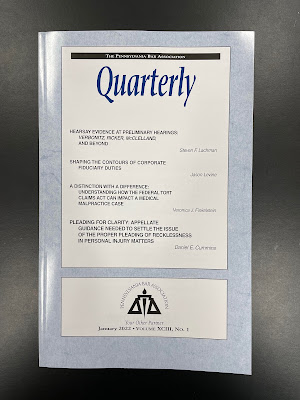Monday, January 31, 2022
ADR Provision in Trampoline Park's Participation Agreement Upheld But Not Provision for Attorney's Fees
According to the Opinion, the Plaintiff filed this negligence action against a trampoline park operator for injuries suffered by the Plaintiff while using a trampoline as a minor allegedly without any supervision or oversight.
The Defendant trampoline park operator filed Preliminary Objections.
 |
| Judge Terrence R. Nealon Lackawanna County |
After reviewing the law of Pennsylvania regarding such agreements and applying the law to the terms of the participation agreement before him, Judge Nealon granted the Preliminary Objections seeking a stay of the tort action given that there was a valid agreement of the parties to participate in alternative dispute resolution.
Anyone wishing to review a copy of this decision may click this LINK.
Thursday, January 27, 2022
Section 1983 Liability for Police Chase Reviewed By Eastern District Court
This is a repeat of yesterday's Tort Talk Blog post -- this time with the Links to the Court's Opinion and companion Order -- sorry about that.
According to the Opinion, the officer was involved in a police chase and allegedly caused a collision with a dirt biker that the officer was pursuing.
In its decision, the court found that the Plaintiff had presented sufficient evidence for a jury to conclude that a seizure had occurred. The court also felt that a reasonable jury could also conclude that the officer used excessive force under the circumstances.
However, relative to the claims against the Defendant city, the court found that the Plaintiff did not sufficiently point to a custom of violent conduct on the part of that Defendant.
As such, the Motion for Summary Judgment was granted in part and denied in part.
Anyone wishing to review a copy of this decision may click this LINK. Here is a LINK to the Court's companion Order.
Source: “Digest of Recent Opinions.” Pennsylvania Law Weekly (Jan. 20, 2022).
Section 1983 Liability for Police Chase Reviewed by Eastern District Court
According to the Opinion, the officer was involved in a police chase and allegedly caused a collision with a dirt biker that the officer was pursuing.
In its decision, the court found that the Plaintiff had presented sufficient evidence for a jury to conclude that a seizure had occurred. The court also felt that a reasonable jury could also conclude that the officer used excessive force under the circumstances.
However, relative to the claims against the Defendant city, the court found that the Plaintiff did not sufficiently point to a custom of violent conduct on the part of that Defendant.
As such, the Motion for Summary Judgment was granted in part and denied in part.
Anyone wishing to review a copy of this decision may click this LINK.
Source: “Digest of Recent Opinions.” Pennsylvania Law Weekly (Jan. 20, 2022).
Wednesday, January 26, 2022
Employer Who Furnishes Alcohol At An Employee Event Considered to be a Social Host -- No Liability for Later DUI Accident By Employee
According to the Superior Court's Opinion, the Pennsylvania was injured in a motor vehicle accident when the vehicle operated by the Defendant driver struck the Plaintiff’s motorcycle.
The Defendant driver was an employee of Dairy Farmers of America. That employer had sponsored a golf outing and encouraged its employees to attend. The employees made a monetary contribution to offset the cost of the greens fees, food, and alcohol. After collecting the contributions from the employees, the employer paid for the event in its entirety.
The Plaintiff alleged that, at the event, the Defendant driver consumed an amount of alcohol that raised his blood alcohol level beyond the legal limit. The Defendant driver then proceeded to drive and was involved in the accident with the Plaintiff.
The Plaintiff sued the Defendant driver as well as his employer under negligence claims. The employer filed a Motion for Judgment on the Pleadings arguing that it was not liable under the Dram Shop Act because it was a social host.
The Pennsylvania Superior Court ruled that an employer who furnished alcohol at a sponsored employee social event was not a licensee or other party subject to per se Dram shop liability but was instead a social host who could not be held proximately liable for an employee causing an alleged drunk driving accident.
Anyone wishing to review a copy of this decision may click this LINK.
Source: “Digest of Recent Opinions.” Pennsylvania Law Weekly (Jan. 4, 2022).
Monday, January 24, 2022
The Benefits of Participating in the Mock Trial Competitions as a Juror
The local District High School Mock Trial Competitions are set to commence next week on February 1, 2022. Hoping you might please consider serving as a juror or a judge for the competitions which will be virtual. The competitions typically start at 6 p.m. and, given that they are being held virtually, you can participate as a juror from the comfort of your own home.
Here is a LINK to the Tort Talk post on my previous article from the Pennsylvania Lawyer magazine that lists the many ways that attorneys can benefit from their participation in the PBA's High School Mock Trial competition as a juror or as an Attorney Advisor to a local high school.
Hoping you might please give the article a read to consider the benefits of this participation.
Here is a LINK to the Tort Talk post on my previous article that appeared in the Pennsylvania Law Weekly regarding the efforts to get the Pennsylvania Supreme Court to change the CLE/CJE Rules to allow for attorneys and judges to secure credits for participation in high school Mock Trial competitons as jurors and judges.
To date, those CLE Rules have not changed. As it stands now, you can still secure CLE credits for taking exercise classes or for an hour of meditation, but not for your participation as a juror or a judge in a Mock Trial competition. Go figure. Ridiculous.
Please note that the high school kids who participate in Mock Trial spend hours and hours crafting and practicing their case presentations in the case this year which involves a murder trial. Hoping you might consider volunteering as a juror so that we can fill the virtual jury boxes for the kids. Thank you.
To sign up to serve as a juror for the Lackawanna County Mock Trial competition, please email Attorney Katie Nealon at knealon@munley.com or Kaitlyn McDonough at the LBA at kmcdonough@lackawannabar.org.
No Duty on UIM Carrier to Advise Plaintiff of Change in the Law
At issue before the court was a Motion to Dismiss the Complaint filed by the carrier. This motion was largely based on statute of limitation arguments.
The court found that the event triggering the running of the statute of limitations was the original denial of the claim and not a later refusal to pay after a renewed demand was submitted by the Plaintiff.
The court applied the four (4) year statute of limitations on the contract claims, including a breach of the covenant of good faith and fair dealing. The court found that these claims were barred based upon the allegations on the face of the Complaint.
The court also noted that the statutory bad faith claims asserted by the Plaintiff was subject to a two (2) year statute of limitations. As such, those claims were also found to be time-barred.
Relative to the Plaintiff’s bad faith claims, the court found that the Plaintiff had failed to allege any specific facts to support these claims, even if they were not barred by the statute of limitations.
Notably, the Plaintiff also asserted that the carrier had violated the UTPCPL because the carrier allegedly breached a duty to notify the insured that the Pennsylvania Supreme Court had changed the law regarding the household exclusion by way of the Supreme Court’s decision in the case of Gallagher v. Geico.
The court in this Devine case found “no support in Pennsylvania law for such an extraordinary duty” as alleged by the Plaintiff.
Judge Gallagher also noted in the Devine case that the “Courts that have addressed the issue of whether a company has a duty to inform its customers of a change in the law have uniformly held that no such duty exists.”
Given that the court found that any effort to amend their Complaint would be futile, the Complaint in this matter was dismissed with prejudice by the court.
Anyone wishing to review a copy of this decision may click this LINK. The companion Order can be viewed HERE.
I send thanks to Attorney Lee Applebaum of the Philadelphia law office of Fineman Krekstein & Harris for bringing this case to my attention. Please check out Attorney Applebaum’s excellent blog entitled The Pennsylvania and New Jersey Bad Faith Case Law blog.
Friday, January 21, 2022
ARTICLE: PLEADING FOR CLARITY: Appellate Guidance Needed To Settle The Issue Of The Proper Pleading of Recklessness in Personal Injury Matters
Here is a LINK to my article entitled "PLEADING FOR CLARITY: Appellate Guidance Needed To Settle The Issue Of The Proper Pleading of Recklessness In Personal Injury Matters" which was just published in the January 2022 edition of The Pennsylvania Bar Association Quarterly.
Note that the article contains a detailed Scorecard of decisions handed down by the various county courts of common pleas all across the Commonwealth of Pennsylvania in recent years, which may prove helpful for your research on this issue, depending upon which county you are litigating the issue.
I send thanks to Professor Robert Rains, the Editor of the PBA Quarterly for his excellent editing of the article into a better article and for selecting this piece for publication.
Also thanking Phyllis Pilla for her editorial assistance with the article as well.
Anyone desiring a copy of any of the cases referenced in the article may contact me at dancummins@CumminsLaw.net.
Wednesday, January 19, 2022
Court Finds No Personal Jurisidiction Over Cruise Line Where Plaintiff's Injury Did Not Occur In Pennsylvania
According to the Opinion, the lawsuit between the Plaintiff and the cruise line grew out of a dispute over the Plaintiff’s request for a cash refund.
The cruise line filed Preliminary Objections raising the issue of personal jurisdiction.
The court ruled that, while the Defendant solicited business from Pennsylvania, including the Plaintiffs’ business, the court lacked specific personal jurisdiction over this foreign corporation because the allegedly injury-causing incident involving the Defendant did not occur in this State of Pennsylvania. The court otherwise found that the combination of the Plaintiffs’ Pennsylvania residency and the Defendant’s solicitation of business in Pennsylvania was not sufficient to confer personal jurisdiction over the Defendant.
As such, the trial court requested that the Superior Court affirm its decision on appeal.
Anyone wishing to review a copy of this decision may click this LINK.
Source: “Digest of Recent Opinions.” Pennsylvania Law Weekly (Dec. 21, 2021).
Tuesday, January 18, 2022
Request For Consolidation of Cases "For All Purposes" Denied Where Each Action Sought Different Remedy
The courted noted that the Plaintiff ski resort initially commenced a tort action against a water utility company seeking compensatory and punitive damages based upon the utility’s alleged discharge of pellets from its water treatment facility into the reservoir which also served as the water source for the resort’s snowmaking systems. The resort asserted that the improperly released pallets clogged its snowmaking machinery which resulted in substantial repair costs, lost snowmaking capacity, closed ski trails due to inadequate snow, and diminished ski season revenue.
The ski resort later instituted a second action against the utility company under the Clean Streams Law in which the ski resort requested the abatement of an alleged public nuisance allegedly created by the utility company’s alleged discharge or pollution.
Before the court in this case was the ski resort’s Motion to Consolidate its two (2) lawsuits “for all purposes.”
Judge Terrence R. Nealon of the Lackawanna County Court of Common Pleas reviewed the Motion under the applicable standards set forth pursuant to Pa. R.C.P. 213(a), regarding consolidation of actions.
However, the court rejected the request for a “complete consolidation” of the separate actions “for all purposes” as there was not a complete identity of parties, claims, defenses, and issues as required by the law.
Given that the claims, defenses, and legal issues in both matters were not identical, the request for a complete consolidation for all purposes was denied.
In the end, the court granted the resort’s request to consolidate the actions for purposes of discovery and trial but noted that each action would retain its separate identity and require its own judgment.
Anyone wishing to review a copy of this decision may click this LINK.
Monday, January 17, 2022
Doctrine of In Pari Delicto Reviewed by Pennsylvania Supreme Court
The Pennsylvania Supreme Court ruled that the trial court in Lackawanna County correctly applied the in pari delicto doctrine and, as such, the lower court’s decision was affirmed.
According to the Opinion, the Plaintiff’s decedent was struggling with substance abuse issues. The decedent had a friend who had a mother who was suffering from blood cancer. The friend’s mother had been prescribed several opioid pain medications which she filled at a particular pharmacy. Family members called the drug store and placed a restriction on who could pick up the mother’s prescriptions.
The decedent and/or his friend allegedly were allowed by the pharmacy to pick up the sick mother's medication. The decedent then allegedly ingested some of that medication and allegedly passed away as a result.
The Pennsylvania Supreme Court noted that the doctrine of in pari delicto is an equitable doctrine that precludes plaintiffs from recovering damages if their cause of action is based, at least partially, on their own illegal conduct. Other jurisdictions call this doctrine the wrongful conduct rule. The Latin phrase translates to English to “in equal fault.”
The rule of the doctrine is rooted in the theory that the court should not lend their aid to a Plaintiff whose cause of action stems from his or her own illegal conduct.
The trial court below in this matter entered judgment for the pharmacy concluding that the in pari delicto doctrine barred recovery given that the decedent’s death was caused, at least partially, by his own criminal conduct, i.e., possessing and consuming a controlled substance that was not prescribed to him.
After reviewing the case before it, the Pennsylvania Supreme Court found that the lower courts had correctly applied the in pari delicto on the facts presented.
Anyone wishing to review a copy of the Majority Opinion by Justice Wecht may click this LINK. The Dissenting Opinion by Justice Dougherty may be viewed HERE.
I send thanks to Attorney James M. Beck for bringing this case to my attention.
Thursday, January 13, 2022
Coverage Found Under a Homeowner's Policy For a Drug Overdose at a House Party
In the case of Kramer v. Nationwide Prop. & Cas. Ins. Co., No. 726 EDA 2021 (Pa. Super. Dec. 2, 2021 Lazarus, J., Dubow, J., and Pellegrini, J.), the Pennsylvania Superior Court addressed an insurance coverage action arising out of an incident during which the insured’s son hosted a house party at his parents’ home while they were out of town. Early in the morning thereafter, the decedent partygoer was found dead and a coroner later determined that the cause of death was a drug overdose.
The decedent’s mother filed a wrongful death and survival action against the homeowners and their son. The Plaintiffs asserted that the son who hosted the party was negligent in supplying the decedent with the drugs that caused his overdose. The Plaintiffs also allege in both the survival and wrongful death claims that the homeowners were negligent in allowing their son to use the home in such regard.
At the time of the incident, Nationwide was the insurance company for the parents at whose house the party was held. Nationwide denied coverage under the case presented.
According to the Opinion, the insurane policy at issue provided that Nationwide must “pay damages and insured is legally obligated to pay due to an occurrence resulting from negligent personal acts or negligence arising out of the ownership, maintenance, or use of real or personal property.”
In asserting that it did not have to provide a defense, Nationwide relied upon coverage exclusions in the policy which applied when certain damages arise from criminal conduct or the use of controlled substances.
The trial court had ruled that Nationwide had a duty to defend and the Pennsylvania Superior Court affirmed this decision.
Although the Pennsylvania Superior Court addressed the policy exclusion noted above, it ruled, in part, that the carrier was required to defend its insured in this suit arising from an alleged accidental drug overdose death because the damages under the Wrongful Death Act did not implicate the term “bodily injury” under the policy definitions.
Anyone wishing to review a copy of this decision may click this LINK.
I send thanks to Attorney Matthew D. Vodzak of the Philadelphia office of Fowler Hirtzel McNulty & Spaulding, LLP for bringing this case to my attention.
Monday, January 10, 2022
Corrected Link to Capenos v. Greentree Hardware Case
Here is the corrected LINK for the case of Capenos v. Greentree Hardware & Electric, Inc., No. GD-20-010087 (Dec. 17, 2021 Ignelzi, J.), highlighted on Tort Talk yesterday, in which the court issued an Order ruling that surveillance footage of an automobile accident was required to be produced to Plaintiff’s counsel prior to the completion of the Plaintiff’s deposition.
Sorry for the faulty Link yesterday and thank you for reading Tort Talk.
Trial Court Judge Rules That Defense Must Produce Video of Accident Before Plaintiff's Deposition
According to one of the litigating attorneys, it does not appear that there is any Pennsylvania state appellate court decision on this particular issue.
Anyone wishing to review a copy of this decision may click this LINK
I send thanks to Attorney Brad D. Trust, Esquire of the Pittsburgh law office of Edgar Snyder & Associates, LLC for bringing this Order to my attention.
Thursday, January 6, 2022
Corrected Link to Jefferson v. Lias Qualified Immunity Case
Yesterday, the case Third Circuit Court of Appeals case of Jefferson v. Lias, No. 20-2526 (3d. Cir. Dec. 16, 2021)(Maj. Op. by Restrepo, J.), was reviewed here on Tort Talk.
In that case the Third Circuit Court of Appeals addressed the circumstances under which a Defendant police officer may be entitled to qualified immunity under a civil rights action brought under 42 U.S.C. §1983.
Here is the corrected LINK for that decision.
I apologize for any confusion that may have been caused by the faulty original link.
Section 1983 Claims Allowed to Proceed Against Police Officers
According to the Opinion, the Plaintiff alleged that the officer shot the Plaintiff’s decedent while trying to arrest him for contempt of court.
In reviewing the record before it, the court found that there was sufficient evidence to show that the officers’ conduct amounted to excessive force and was the proximate cause of the Plaintiff’s death.
However, the court dismissed the claims of municipal liability and state-created danger.
Anyone wishing to review a copy of this decision may click this LINK.
Source: “Digest of Recent Opinions.” Pennsylvania Law Weekly (Dec. 3, 2021).
Third Circuit Court of Appeals Addresses Qualified Immunity for Police Officers in Civil Rights Actions
In this case, the district court had granted a Defendant police officer’s summary judgment motion as to the alleged use of excessive force in violation of the Fourth Amendment. The city was also granted summary judgment as to the Plaintiff’s alleged Monell claims.
On appeal, the Third Circuit Court of Appeals found that the district court had improperly weighed evidence in determining that the Plaintiff allegedly presented a danger to those in the area based upon his escape and the court found that there were factual issues to be decided by the jury.
The Third Circuit Court of Appeals then also discussed the doctrine of qualified immunity and provided clarification as to how it should be determined whether a right at issue is clearly established at the time of the alleged violation.
Anyone wishing to review a copy of this decision may click this LINK
Wednesday, January 5, 2022
Pennsylvania Superior Court Addresses Validity of a Concise Statement of Matters Complained of on Appeal; Also Upholds Exculpatory Clause in a Lease
In the case of Keystone Specialty Services Co. v. Ebaugh, No. 1289 WDA 2020 (Pa. Super. Nov. 22, 2021 Olson, J., Nichols, J., and Collins, J.) (Op. by Collins, J.), the Pennsylvania Superior Court affirmed the entry of summary judgment in favor of landlord Defendants in a breach of contract and negligence action that the Plaintiff filed.
The case arose out of alleged damage to equipment and other personal property that the Plaintiff stored in a building owned by the landlord. The Plaintiff’s property allegedly sustained water damage from water flowing from a broken pipe in the building.
The landlord Defendants asserted that exculpatory provisions in the lease agreement protected the landlords from any liability exposure. The trial court entered summary judgment on the basis of the exculpatory clauses and the Plaintiff eventually appealed.
With regard to an appellate procedure issue of note, the court found fault with the Plaintiff’s sparse Concise Statement of Errors Complained of on Appeal required by Pa. R.A.P. 1925(b). The Plaintiff had responded that it was unable to discern from the lower court’s Order as to the reasons relied upon by the trial court in entering its decision.
In this regard, the Pennsylvania Superior Court noted that, if a party feels that it cannot discern the basis for the trial court’s Order sufficiently in order to identify the issues that the party intends to raise on appeal, the party is required to preface the [Rule 1925(b)] Statement with an explanation as to why the Statement has identified the errors only in general terms. See Pa. R.A.P. 1925(b)(4)(i).
On this basis, in terms of the Plaintiff’s failures with its Concise Statement, the court found that the Plaintiff’s appeal was barred by the Doctrine of Waiver. The Pennsylvania Superior Court also went on to note that the Plaintiff’s appeal failed on the merits in any event.
In this regard, the court upheld the exculpatory clause relied upon by the Defendant. The court noted that exculpatory clauses and contracts are valid (1) where they do not contravene public policy, (2) where the clauses are between persons relating entirely to their own private affairs, and (3) where each party was a free bargaining agent to the agreement. See Op. at 9.
Anyone wishing to review a copy of this decision may click this LINK.
Pennsylvania Supreme Court Rules That a Plaintiff Can Rely on Both Concrete Evidence and Doctrine of Res Ipsa Loquitur to Prove Negligence in the Same Case
The court noted that the American law translation of that phrase is “the thing speaks for itself.”
Justice Wecht noted in his Opinion that the doctrine of res ipsa loquitur has been recognized in Pennsylvania as allowing for a category of circumstantial evidence which may suffice to establish negligence where more specific and concrete evidence of the events leading up to the injury eludes even diligent investigation.
This Lageman case arose out of a medical malpractice action. The issue before the Pennsylvania Supreme Court was whether the doctrine of res ipsa loquitur is precluded in a case where the Plaintiff has allegedly introduced enough “direct” evidence of the Defendant's negligence such that the doctrine of res ipsa loquitur is not the only avenue towards a finding of liability. In other words, whether the two (2) approaches to satisfying the Plaintiff’s evidentiary burden of proof are mutually exclusive.
In so ruling, the Majority of the Court noted that it has long been the law of Pennsylvania that a Plaintiff has no obligation to choose one theory of liability to the exclusion of another. The Court reasoned that permitting a Plaintiff to present direct evidence while simultaneously invoking the res ipsa loquitur doctrine will only disadvantage a Defendant as to whom the claims becomes more facially meritorious as more competent evidence emerges.
The Court did note that, a Plaintiff must still make out a prima facie case to support a res ipsa loquitur jury instruction. In other words, a Plaintiff must prove that he or she has been injured by a casualty of a sort that normally would not have occurred but for negligence on the part of a Defendant.
In this regard, the Court noted that the doctrine of res ipsa loquitur would obviously apply in the case of where a surgeon leaves a sponge in a patient and sews up the patient at the end of a surgery, an injury would seemingly not occur in the absence of negligence.
Anyone wishing to review a copy of the Majority decision written by Justice Wecht may click this LINK. The Concurring and Dissenting Opinion by Chief Justice Baer can be viewed HERE. The Dissenting Opinion by Justice Saylor can be viewed HERE.
I send thanks to Attorney Dale G. Larrimore of the Philadelphia law firm of Larrimore & Farnish, LLP for bringing this case to my attention.
Tuesday, January 4, 2022
A Nice Primer on the Hearsay Rule
In the case of Nitkin v. Main Line Health, No. 2:20-CV-04825-KSM (E.D. Pa. Oct. 26, 2021), the Federal District Court in the Eastern District of Pennsylvania ruled that notes taken by the medical director of the Plaintiff’s former employer were non-hearsay and, as such, were deemed to be admissible as they fell within the party-opponent exclusion found under F. R.E. 801(d)(2)(D).
Based upon this ruling, the court denied in part, and granted in part, the Defendant’s Motion In Limine.
Anyone wishing to review a copy of this decision may click this LINK.
Source: “Digest of Recent Opinions.” Pennsylvania Law Weekly (Nov. 18, 2021).
Motion to Remand Regular Use Exclusion Issues Back to State Court Denied
The court otherwise granted the Defendant’s carrier’s Motion to Dismiss the Complaint for failing to plead specific facts sufficient to make out a plausible bad faith claim. The court did allow the Plaintiff an opportunity to file an Amended Complaint.
Anyone wishing to review a copy of this decision may click this LINK.
I send thanks to Attorney Lee Applebaum of the Philadelphia law firm of Fineman Krekstein & Harris, and also the writer of the excellent Pennsylvania and New Jersey Insurance Bad Faith Case Law blog, for bringing this decision to my attention.
Monday, January 3, 2022
TORT TALK AS A RESEARCH TOOL
Most Tort Talkers receive their Tort Talk info by way of email. If you are not already an email subscriber to Tort Talk and would like to become one (it's FREE!), please go to Tort Talk at www.TortTalk.com and insert your email address into the Email Subscription box in the upper right hand corner of the blog and follow the instructions to complete the process.
Once you are up and running, you will automatically receive the updated posts added to Tort Talk (an average of 2-3 per week) on notable cases and trends in Pennsylvania Civil Litigation Law.In addition to Tort Talk being a way to get free continuing updates on notable new cases and trends, it can also serve to kickstart your legal research in a streamlined fashion if you actually go to the Tort Talk site at www.TortTalk.com.
Please note that Tort Talk is NOT an exhaustive legal research site--you should always supplement your research on your issue(s) presented elsewhere to ensure that you have a thorough review of the area of law in question. Also, any case you find should be "Shepardized" to see if there has been any more recent, adverse rulings.
Here are the research tools available on Tort Talk that you can use to kickstart and streamline your research:
Search This Blog Box
The "Search This Blog" Box in the upper right hand column of the site allows readers to type in search terms or key words to look for posts on that particular topic.
Post-Koken Scorecard
You can always access the Post-Koken Scorecard to check on the status of decisions in your county on Post-Koken issues by scrolling down the right hand column of the blog and clicking on the date under the Label "Post-Koken Scorecard."
Facebook Discovery Scorecard
You can always access the Facebook Discovery Scorecard to check on the status of Pennsylvania decisions on Facebook Discovery issues by scrolling down the right hand column of the blog and clicking on the date under the Label "Facebook Discovery Scorecard."
Labels
Also further down on the right hand column of the Tort Talk blog is a section called "Labels," which is another tool that you can use to find cases or articles on a specific topic.
If you type the word "Article" in the Search Box on the upper right hand corner of the blog, you will get to a number of different articles on various civil litigation issues.
Links
Last but certainly not least, down on the right hand column is a list of "Links" I have created to other sites, including my Firm's website and other online professional profiles that I have created along with links to some other legal and non-legal-related websites that may be of interest.
Thanks again for reading Tort Talk and thanks to all who have provided tips on breaking news and cases of note. I am grateful for your interest and support. Please feel free to send me a copy of any notable decisions you may generate in your practice for possible highlighting here on Tort Talk.
If I should be able to you help out in any way, please do not hesitate to contact me at dancummins@CumminsLaw.net.
































